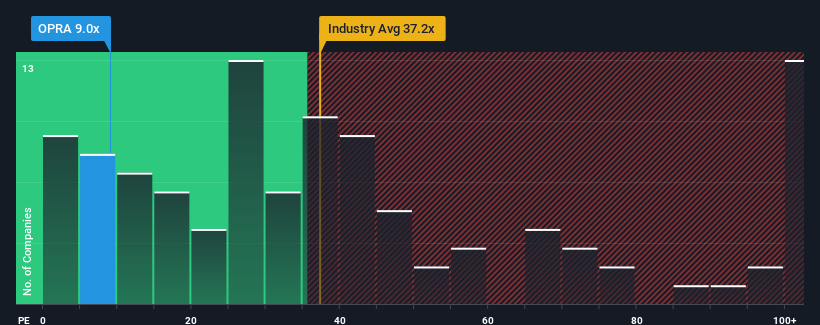- United States
- /
- Software
- /
- NasdaqGS:OPRA
There's No Escaping Opera Limited's (NASDAQ:OPRA) Muted Earnings Despite A 38% Share Price Rise
Opera Limited (NASDAQ:OPRA) shares have had a really impressive month, gaining 38% after a shaky period beforehand. The last 30 days bring the annual gain to a very sharp 28%.
Although its price has surged higher, Opera's price-to-earnings (or "P/E") ratio of 9x might still make it look like a strong buy right now compared to the market in the United States, where around half of the companies have P/E ratios above 19x and even P/E's above 33x are quite common. Nonetheless, we'd need to dig a little deeper to determine if there is a rational basis for the highly reduced P/E.
Recent times have been pleasing for Opera as its earnings have risen in spite of the market's earnings going into reverse. It might be that many expect the strong earnings performance to degrade substantially, possibly more than the market, which has repressed the P/E. If you like the company, you'd be hoping this isn't the case so that you could potentially pick up some stock while it's out of favour.
Check out our latest analysis for Opera

Does Growth Match The Low P/E?
In order to justify its P/E ratio, Opera would need to produce anemic growth that's substantially trailing the market.
Retrospectively, the last year delivered an exceptional 192% gain to the company's bottom line. The strong recent performance means it was also able to grow EPS by 152% in total over the last three years. Accordingly, shareholders would have probably welcomed those medium-term rates of earnings growth.
Shifting to the future, estimates from the six analysts covering the company suggest earnings growth is heading into negative territory, declining 6.9% per year over the next three years. With the market predicted to deliver 10% growth per year, that's a disappointing outcome.
In light of this, it's understandable that Opera's P/E would sit below the majority of other companies. Nonetheless, there's no guarantee the P/E has reached a floor yet with earnings going in reverse. There's potential for the P/E to fall to even lower levels if the company doesn't improve its profitability.
The Key Takeaway
Even after such a strong price move, Opera's P/E still trails the rest of the market significantly. Typically, we'd caution against reading too much into price-to-earnings ratios when settling on investment decisions, though it can reveal plenty about what other market participants think about the company.
We've established that Opera maintains its low P/E on the weakness of its forecast for sliding earnings, as expected. At this stage investors feel the potential for an improvement in earnings isn't great enough to justify a higher P/E ratio. It's hard to see the share price rising strongly in the near future under these circumstances.
Before you settle on your opinion, we've discovered 2 warning signs for Opera that you should be aware of.
Of course, you might also be able to find a better stock than Opera. So you may wish to see this free collection of other companies that have reasonable P/E ratios and have grown earnings strongly.
New: AI Stock Screener & Alerts
Our new AI Stock Screener scans the market every day to uncover opportunities.
• Dividend Powerhouses (3%+ Yield)
• Undervalued Small Caps with Insider Buying
• High growth Tech and AI Companies
Or build your own from over 50 metrics.
Have feedback on this article? Concerned about the content? Get in touch with us directly. Alternatively, email editorial-team (at) simplywallst.com.
This article by Simply Wall St is general in nature. We provide commentary based on historical data and analyst forecasts only using an unbiased methodology and our articles are not intended to be financial advice. It does not constitute a recommendation to buy or sell any stock, and does not take account of your objectives, or your financial situation. We aim to bring you long-term focused analysis driven by fundamental data. Note that our analysis may not factor in the latest price-sensitive company announcements or qualitative material. Simply Wall St has no position in any stocks mentioned.
About NasdaqGS:OPRA
Opera
Provides mobile and PC web browsers and related products and services in Norway and internationally.
Very undervalued with flawless balance sheet and pays a dividend.
Similar Companies
Market Insights
Community Narratives



